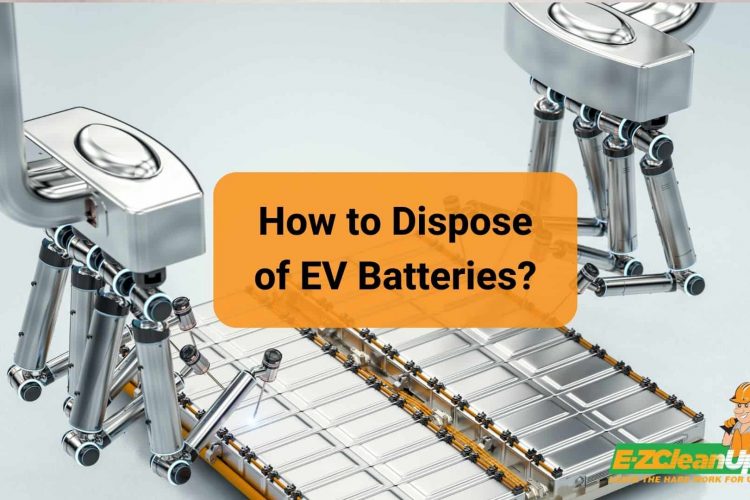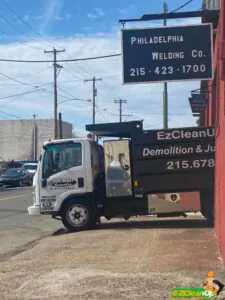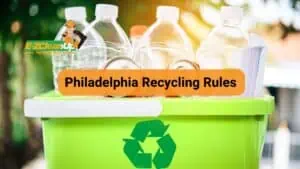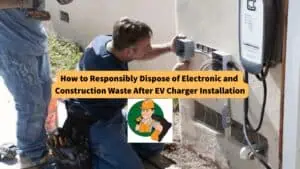Do you want to know how to dispose of EV batteries? Here are your best options:
- Send to auto recyclers and specialist firms for dismantling and material separation.
- Use dealership and manufacturer recycling programs, like Toyota’s.
- Follow government and industry guidelines for safe disposal.
Continue reading to understand the importance and methods of responsibly disposing of EV batteries.
The Sustainable Ways of Disposing of EV Batteries
Electric Vehicles (EVs) have rapidly become a significant part of the global automotive market. However, this growth brings new challenges, particularly in the disposal and recycling of EV batteries.
EV batteries are complex and contain a mix of valuable yet potentially hazardous materials. Recycling these batteries is not straightforward due to their intricate construction and chemistry. This presents unique challenges in ensuring that these batteries are recycled safely and effectively.
The sustainable disposal of EV batteries is not just about reducing landfill waste. Proper disposal methods help in reclaiming valuable materials and preventing the release of toxins into the environment.
Here’s a deep dive into your options when it comes to disposing of EV batteries without causing harm to the environment:
1. Send the Batteries to Auto Recyclers and Specialist Firms
Auto recyclers and specialist firms have the expertise and equipment necessary to handle the complex nature of EV batteries safely.
The steps involved usually include the following:
Dismantling and Breakdown of Battery Packs
This process requires specialized knowledge and tools, as battery packs are made up of numerous cells and modules, along with intricate electronic controls. Proper dismantling ensures that each component is safely separated and prepared for the next recycling phase.
Separation and Purification of Metals
Metals like lithium, nickel, cobalt, and manganese are valuable and can be reused if properly extracted. The extracted metals, once purified, are often of high enough quality to be used in the production of new batteries or other products, which contributes to a more circular economy in the EV sector.
2. Dealerships and Manufacturer Programs
Beyond auto recyclers and specialist firms, another pivotal channel for the sustainable disposal of EV batteries involves dealerships and manufacturer programs. These programs are often tailored to handle the specific needs of their own EV and hybrid vehicle models.
Many car manufacturers have initiated programs to collect used hybrid battery packs. These programs are typically available through dealerships where vehicle owners can return their old or end-of-life batteries. This system is convenient, and it ensures that batteries do not end up in landfills but are instead directed toward specialized recycling facilities.
Toyota’s Notable Recycling Program
Toyota, known for pioneering hybrid technology, has set up an efficient recycling system for its batteries. They ensure that the used battery packs from their vehicles, especially the popular Prius, are properly dismantled and recycled.
Toyota collaborates with recycling companies to manage the complex process of extracting valuable materials from these batteries.
Their efforts demonstrate how manufacturer-led initiatives can play a significant role in addressing the recycling challenges posed by the growing number of EVs and hybrid vehicles on the road.

3. Following Government and Industry Initiatives Regarding Safe Disposal of EV Batteries
Following China’s lead, the European Union (EU) is also gearing up to establish stringent requirements for EV battery disposal and recycling.
The expected mandates are likely to include:
- Extended Producer Responsibility (EPR): Similar to China, the EU is expected to emphasize the responsibility of EV manufacturers in the collection and recycling of end-of-life batteries.
- High Recycling Efficiency Targets: Setting ambitious targets for recycling efficiency, the EU requirements may demand a high percentage of battery materials, such as lithium, nickel, and cobalt, to be reclaimed and reused.
- Battery Passport: The introduction of a ‘battery passport’ could be a part of these requirements, aimed at improving traceability and ensuring transparent documentation of the battery’s lifecycle.
In the United States, particularly in states like California, state initiatives are focusing on promoting sustainable practices in EV battery disposal:
- Incentives for Recycling: States may offer financial incentives for recycling batteries. This encourages both consumers and businesses to choose recycling over landfill disposal.
- Collaboration with Private Sector: These initiatives often involve partnerships with private firms specializing in battery recycling technologies.
- Guidelines and Standards: States like California are known for setting progressive environmental standards and guidelines, which are expected to include specific protocols for the handling, transportation, and recycling of EV batteries.
Research Initiatives and Funding
Within the broader landscape of EV battery recycling, significant research initiatives and funding efforts, particularly the US Department of Energy’s ReCell Center and the UK’s ReLiB Project, stand out for their forward-thinking approaches and strategic importance in developing sustainable recycling technologies.
US Department of Energy’s ReCell Center
The primary goal of the ReCell Center is not just to promote recycling efficiency but also to create economically competitive recycling processes that can enhance the value chain of EV battery production.
The center is exploring next-generation recycling technologies, including novel methods for material separation and recovery that promise to enhance the purity and quality of recycled materials. By reducing the cost and environmental impact of battery recycling, the ReCell Center aspires to drive the domestic supply chain’s resilience and security for critical battery materials.
The UK’s ReLiB Project
This project is an integrated approach to understanding the life cycle of lithium-ion batteries. It aims to maximize resource efficiency and minimize environmental impact. Bringing together experts from different fields, the project seeks to create a holistic recycling infrastructure in the UK, which can be a model for other regions globally.
The ReLiB project is not just about addressing today’s recycling needs but also about shaping the future of battery design to make end-of-life recovery easier and more efficient.
As the global demand for EVs surges, there’s a pressing need to address the impending wave of retired batteries, potentially creating environmental and economic challenges. Effective recycling methods can significantly reduce reliance on foreign sources for new materials, particularly critical in the current geopolitical climate.
Moreover, embracing a circular economy model, where battery materials are continuously reused, could lead to substantial reductions in waste, pollution, and resource depletion.
The Valuable Metals in EV Batteries
The stream of critical materials in EV batteries underscores the importance and complexity of recycling efforts. These batteries are not just an energy source; they are also a repository of valuable metals, pivotal to both the economic and environmental aspects of EV technology.
Key Metals in EV Batteries
EV batteries, especially lithium-ion batteries, contain several valuable metals, including lithium, nickel, cobalt, manganese, and aluminum. These metals are not only costly but also hold strategic importance in the EV industry. Their value is projected to increase as demand for EVs continues to surge.
Why Recycling These Metals is Crucial?
- Environmental Benefits: Mining and processing of these metals can be environmentally damaging. Recycling can significantly reduce these environmental impacts.
- Supply Challenges: The growing demand for these metals outdoes the rate at which they can be mined and processed. Recycling can help bridge this supply gap.
Impact on Battery Cost and Efficiency
The cost of batteries can be significantly reduced if recycled materials are used. This will make EVs more affordable and competitive with traditional combustion engine vehicles. Advanced recycling processes ensure that the performance of batteries made with recycled materials matches that of batteries made with new materials.
EV batteries contain a complex mix of metals, each playing a crucial role in the battery’s performance and longevity. This complexity adds to the challenges of recycling but also highlights the potential value that lies in efficient recycling processes.
By recovering these metals, not only do we conserve resources and reduce environmental impact, but we also boost the economic growth of the EV market.
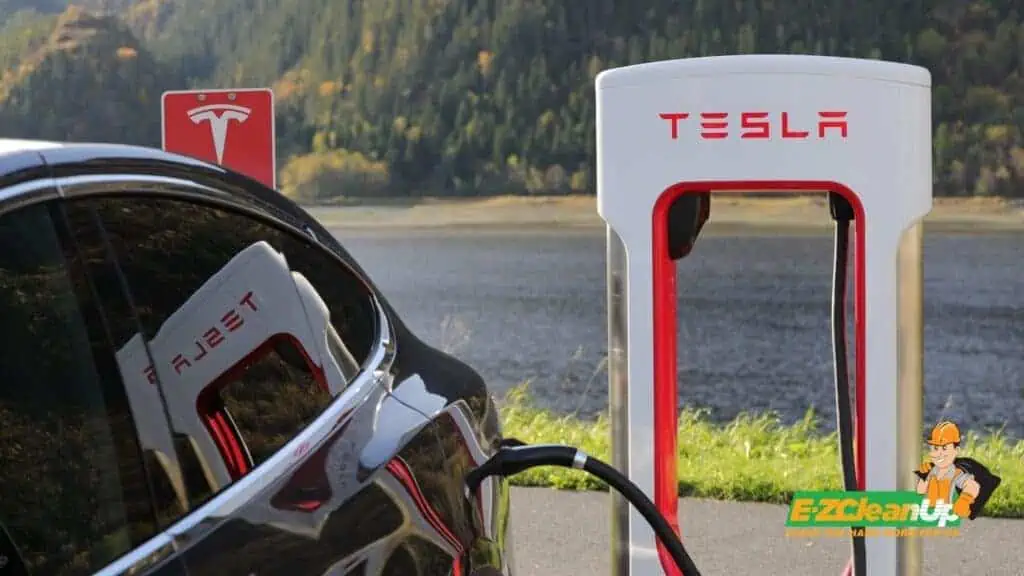
Recycling of Battery Metals
The crucial elements lithium, nickel, cobalt, manganese, and aluminum, which form the backbone of most EV batteries, especially in the lithium-ion models, are important not just for their functional properties but also for their economic and environmental impact.
- Lithium: Known for its high energy density, lithium is a key component in providing long-range capabilities for EVs.
- Nickel: This metal enhances the energy storage capacity of the battery, directly influencing the vehicle’s performance and range.
- Cobalt: Critical for battery longevity and safety, cobalt stabilizes the battery structure, allowing for regular charging and discharging.
- Manganese: Manganese improves the battery’s thermal management, which is important for safety and efficiency.
- Aluminum: Used in the battery’s casing and internal components, aluminum is chosen for its lightweight and conductivity.
Recycling Methods and Purification
The process of recycling these metals involves several sophisticated steps to ensure efficiency and purity, crucial for their effective reuse in new batteries.
- Collection and Sorting: The initial stage involves collecting spent batteries and sorting them based on type and chemistry.
- Mechanical Processing: Batteries are then mechanically shredded, which helps in the breakdown of larger components.
- Hydrometallurgical Process: This chemical process involves using aqueous solutions to separate metals. It’s particularly effective for extracting lithium, cobalt, nickel, and manganese.
- Pyrometallurgical Process: A thermal method used mainly for extracting cobalt and nickel, this involves heating the battery waste to a high temperature.
- Direct Recycling: This relatively new method aims to recover and directly reuse battery components without breaking them down into individual metals, preserving the original structure and composition.
By ensuring these metals are purified and re-integrated into the manufacturing process, the reliance on virgin materials, often associated with intensive mining and processing activities, is significantly reduced.
>> You might also be interested to know How Much Are Junk Car Batteries Worth?
The Hazards of Improper Disposal of EV Batteries
Improper disposal of EV batteries leads to several critical hazards:
- Environmental Contamination: EV batteries contain toxic substances like lithium, cobalt, and nickel. If discarded in landfills, these chemicals can leak into the soil and groundwater and can pose significant environmental risks.
- Risk of Fires and Explosions: Damaged or improperly stored EV batteries can lead to fires or explosions, particularly because lithium-ion batteries, commonly used in EVs, are prone to overheating and thermal runaway.
- Waste of Valuable Resources: EV batteries consist of metals that are scarce and have a high economic value. Discarding them wastefully means losing these critical materials, which are essential for manufacturing new batteries.
Advantages of Recycling Over New Mining
Recycling EV batteries presents numerous advantages over new mining, especially as the demand for EVs and their batteries skyrockets in the 2020s and 2030s.
Environmental Benefits:
- Reduced Ecological Footprint: By reusing existing materials, the need for resource-intensive mining activities decreases significantly.
- Decreased Energy Consumption: The process of recycling battery materials generally consumes less energy compared to extracting and processing virgin materials. This difference leads to a lower overall carbon footprint for battery production.
Economic Advantages
- Cost Efficiency: Recycling can be more cost-effective in the long run than mining. The initial investments in recycling technologies pay off by reducing the expenses associated with raw material extraction, transportation, and processing.
- Stabilization of Supply Chain: Recycling provides a more predictable and stable supply of necessary materials like lithium, cobalt, and nickel. This stability can protect against market volatility and supply disruptions often seen in mining sectors.
Geopolitical and Strategic Implications
- Reduced Dependency on Mining Hotspots: Many of the critical minerals used in EV batteries are concentrated in specific geographic regions. Recycling helps decrease reliance on these areas, which are often full of labor issues and political instability.
- Enhanced Material Security: A solid recycling infrastructure can ensure a domestic supply of critical battery materials, which is vital for countries looking to bolster their energy independence and secure their position in the global EV market.
Promoting Circular Economy
- Resource Recovery and Reuse: The practice of recycling aligns with the principles of a circular economy, wherein materials are kept in use for as long as possible.
- Innovation and Employment: The recycling industry also brings innovation in material recovery and processing technologies. It creates new employment opportunities and contributes to economic growth.
Supporting Sustainable Development
Recycling contributes to several United Nations Sustainable Development Goals (SDGs), such as responsible consumption and production (SDG 12) and climate action (SDG 13). By reducing the need for new mining, recycling aids in conserving natural resources and curbing ecological harm.
The Role of the Inflation Reduction Act
The Inflation Reduction Act (IRA) of 2022 is a landmark legislation in the United States that significantly impacts the future of EV battery recycling. This act plays an important role in shaping the industry. It offers both incentives and a framework to enhance the recycling ecosystem.
It provides the following in the EV recycling industry:
Financial Incentives and Support
The IRA allocates funds and tax credits to support the development of advanced recycling facilities and technologies. This financial backing is crucial for scaling up recycling operations to handle the increasing volume of used EV batteries.
By providing financial incentives, the IRA encourages private companies and startups to invest in recycling technologies and facilities. This boost is expected to spur innovations in efficient and cost-effective recycling methods.
Strengthening Supply Chains
The IRA emphasizes the importance of strengthening domestic supply chains for critical battery materials. By fostering a local recycling industry, the U.S. can reduce dependence on imported materials. This way, it is able to enhance national security and supply chain resilience.
The Act also promotes the localization of battery production and recycling. It aims to create a fully integrated battery supply chain within the United States. This move is expected to reduce logistics costs and minimize the carbon footprint associated with transporting battery materials.
Setting Standards and Regulations
The IRA is likely to lead to the establishment of more stringent environmental and safety standards for battery recycling. This emphasis on compliance will ensure that recycling practices are not only effective but also environmentally responsible and safe for workers.
With new policies and regulations, there might be an increased emphasis on transparency in the recycling process. Companies may be required to report more detailed information on how they collect, recycle, and dispose of batteries.
Conclusion
The sustainable disposal of EV batteries is an achievable goal! The advancements in recycling technologies, along with increasing awareness and stronger regulations, assure us that a greener approach to battery end-of-life management is within reach.
Recycling EV batteries holds great promise for a more sustainable future. The extraction and reintegration of valuable metals from old batteries into new ones can create a more sustainable, circular economy. It minimizes the need for new mining activities and reduces overall waste.
The path to effective EV battery disposal and recycling is paved by the collective efforts of governments, industries, and consumers. Governments must lead with forward-thinking policies and regulations that incentivize recycling and responsible disposal. The industry has to continue pushing the boundaries of innovation in battery design and recycling technologies. Finally, consumers play a critical role by making informed choices and properly disposing of batteries.
As we continue to advance in technology and collaboration, the vision of a fully sustainable EV ecosystem becomes not just a possibility but a reality.
If you have a junk electric car you want to sell for cash, EZ CleanUp can help!
Call us now, and we’ll provide a free estimate of how much you will get for your junk car!

